
Earthworm Jim is a 1994 run and gun platform game developed by Shiny Entertainment, featuring an earthworm named Jim, who wears a robotic suit and battles the forces of evil. The game was released for the Sega Genesis and Super Nintendo Entertainment System, before being subsequently ported to a number of other video game consoles.

Killer Instinct is a 2.5D fighting game developed by Rare and published by Midway. It was originally released for arcades in October 1994, and ported to the Super Nintendo Entertainment System and the Game Boy the following year. The game's plot involves an all-powerful corporation organizing a fighting tournament. The story was adapted in a limited comic book series published under the short-lived Acclaim Comics imprint.
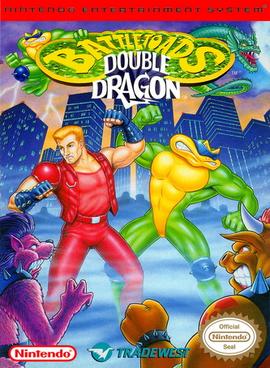
Battletoads/Double Dragon is a 1993 beat 'em up developed by Rare and published by Tradewest. It was originally released for the Nintendo Entertainment System and later ported to the Mega Drive/Genesis, Super NES, and Game Boy. Retro-bit Publishing has re-released the 8-bit NES version in early 2022 with plans to release the 16-bit versions later this year.

The Blues Brothers is a platform game based on the band The Blues Brothers, where the object is to evade police and other vigilantes to get to a blues concert. The game was released for IBM PC, Amstrad CPC, Amiga, Commodore 64, and Atari ST in 1991, and for the NES and Game Boy in 1992. It was created by Titus France. A sequel, The Blues Brothers: Jukebox Adventure, was released for the SNES in 1993 and for IBM PC compatibles and the Game Boy in 1994. The theme music of the video game is an electronic arrangement of Peter Gunn. Zzap!64 ranked the Commodore 64 port the eighth-best all-time Commodore 64 game in 1993, and the game was the best platformer for PC, Atari ST and Amiga consoles of 1991 of Zero journalist David Wilson.
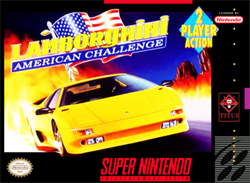
Lamborghini American Challenge is a 1992 racing video game developed and published by Titus France for the Amiga, Amstrad CPC, Atari ST, Commodore 64, MS-DOS, Super NES, Amiga CD32, and Game Boy.
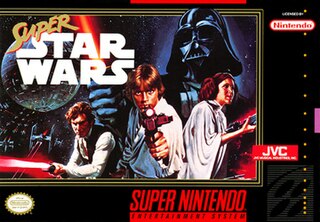
Super Star Wars is an action video game developed by LucasArts and Sculptured Software for the Super Nintendo Entertainment System. It is based on the 1977 film Star Wars: Episode IV - A New Hope. It was released by JVC Musical Industries in Japan and Nintendo in North America in 1992 and Europe in 1993. The game was followed by two sequels based on the subsequent Star Wars films, Super Star Wars: The Empire Strikes Back (1993) and Super Star Wars: Return of the Jedi (1994). The game was re-released in November 1996 as part of Nintendo's Player's Choice series. It was released on the Wii’s Virtual Console by LucasArts in 2009.

Super Star Wars: The Empire Strikes Back is a 1993 action video game developed by LucasArts and Sculptured Software and published by JVC Musical Industries for the Super Nintendo Entertainment System. It is based on the 1980 film The Empire Strikes Back. It is the sequel to Super Star Wars. The game was followed by a sequel, Super Star Wars: Return of the Jedi. Unlike its predecessor, Nintendo wasn’t involved in its publishing. The game was re-released on the Wii's Virtual Console in North America on August 24, 2009 and in the PAL regions on October 2, 2009, alongside the other games in the Super Star Wars series.

Super Star Wars: Return of the Jedi is an action video game developed by LucasArts and Sculptured Software and published by JVC Musical Industries for the Super Nintendo Entertainment System in North America on June 22, 1994, Europe on March 30, 1995 and in Japan on June 23, 1995. It is based on the 1983 film Return of the Jedi. It was ported to the Game Boy and Game Gear by Realtime Associates, which were published by THQ in 1995. The game was re-released on the Wii Virtual Console in North America on September 7, 2009 and in PAL regions on October 16, 2009, alongside the other games in the Super Star Wars series.
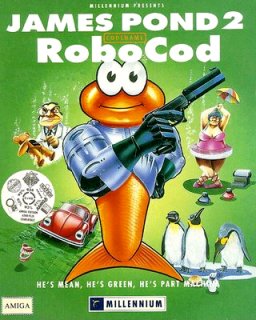
James Pond 2: Codename: RoboCod, also known as Super James Pond on SNES in North America, and Game Boy, and Super James Pond 2 in Europe, is a 1991 platform video game. It was developed by the same British teams as the original. The title music by Richard Joseph is a marimba-heavy rendition of the RoboCop film theme. It is the second installment in the James Pond series.

There have been several video games based on the 1991 film Hook. A side-scrolling platform game for the Nintendo Entertainment System (NES) and Game Boy was released in the United States in February 1992. Subsequent side-scrolling platform games were released for the Commodore 64 and the Super Nintendo Entertainment System (SNES), and an arcade beat ‘em up by Irem later in 1992, followed by versions for the Sega CD, Sega Genesis, and Sega's handheld Game Gear console in 1993.

Alfred Chicken is a platform video game developed by Twilight and published by Mindscape. The game was released for Amiga, Amiga CD32, Game Boy, NES, Super NES in 1993 and February 1994, in Europe and North America, respectively. A Europe-exclusive remake of the game, entitled Alfred's Adventure, was developed by Möbius Entertainment and released by SCi for Game Boy Color in June 2000. Another remake, named Alfred Chicken, was also developed by King Monkey, a division of Möbius Entertainment, and released by Sony Computer Entertainment for PlayStation in 2002.
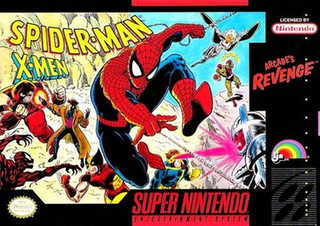
Spider-Man and the X-Men in Arcade's Revenge is a video game released for the Super NES in 1992 by LJN. It was released for the Genesis and Game Gear as well as the Game Boy. The game features Marvel Comics characters Spider-Man and the X-Men as they battle their captor, the villainous Arcade.

Disney's The Jungle Book is a series of platform video games based on the 1967 Disney animated film of the same name. The game was released by Virgin Interactive Entertainment in 1994 for the Game Boy, Nintendo Entertainment System, Master System, Genesis/Mega Drive, Game Gear, Super Nintendo Entertainment System, and MS-DOS. While gameplay is the same on all versions, technological differences between the systems forced changes – in some case drastic – in level design, resulting in six fairly different versions of the 'same' game. This article is largely based upon the Genesis version.

The Lion King is a platform game based on Disney's 1994 animated film The Lion King. The game was developed by Westwood Studios and published by Virgin Interactive Entertainment for the Super NES and Genesis in 1994, and was ported to MS-DOS, Amiga, Game Gear, Master System, and Nintendo Entertainment System. The Amiga, Master System, and NES versions were only released in the PAL region. It is the final licensed NES game worldwide. The game follows Simba's journey from a young cub to the battle with his uncle Scar as an adult.
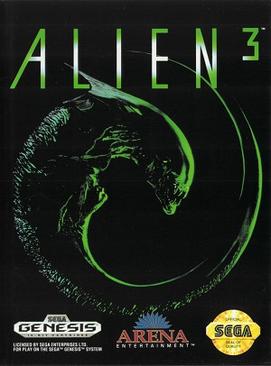
Alien 3 is a run and gun game based on the 1992 film of the same name. It was released for the Genesis and Amiga in 1992, then for the Commodore 64, Game Boy, Game Gear, Nintendo Entertainment System, Super Nintendo Entertainment System, and Master System.

The Adventures of Batman & Robin is a series of video game adaptations released between 1994 and 1995 featuring the DC Comics characters Batman and Robin based on Batman: The Animated Series. The games were released for numerous platforms, with the Genesis, Game Gear, and Sega CD versions published by Sega while the Super NES version was published by Konami.

Waterworld is a series of video games released for the Super Nintendo Entertainment System, Virtual Boy, MS-DOS, Microsoft Windows and Game Boy, based on the film of the same name, along with unpublished versions for the Mega Drive/Genesis, Sega Saturn, Atari Jaguar, 3DO and PlayStation. These games were produced by Ocean Software. The SNES and Game Boy games were released only in Europe in 1995 and the Virtual Boy game was released exclusively in North America in November 1995. It was released for PC in 1997. The game received widespread negative reviews and the version released for the Virtual Boy is generally considered to be the worst game of its 22 releases.
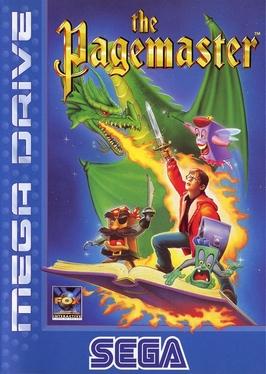
The Pagemaster is a platform game released in conjunction with the 1994 film The Pagemaster for the Super Nintendo Entertainment System, Game Boy, and Sega Genesis.
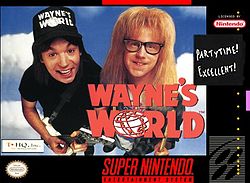
Wayne's World is an action video game based on the film of the same name and released in 1993 by THQ. Different versions of the game were released; the NES and Game Boy games were developed by Radical Entertainment and feature both protagonists Wayne and Garth as playable characters. The Super NES and Sega Mega Drive/Genesis games were developed by Gray Matter and feature only Wayne as a playable character.

Bubsy in: Claws Encounters of the Furred Kind, often shortened to Bubsy, is a platform game first released for the Sega Genesis and Super Nintendo Entertainment System by Accolade in 1993. It is the first entry in the Bubsy series of video games. The game's title is a play on words in reference to the film Close Encounters of the Third Kind, with the game revolving around Bubsy defending the planet's supply of yarn balls from alien invaders.



















